|
Limitar tu búsqueda
[+–] Creator
[+–] Editorial
[+–] Fecha
[+–] Formato
[+–] Idioma
[+–] Tipo de documento
[+–] Tipo de recurso
[+–] Classification
|

|
|
La práctica médica en el contexto de la economía sanitaria. Falsas premisas y verdaderos problemas
En los últimos 30 años, la ciencia médica ha mostrado un significativo desarrollo mediado por la acelerada innovación tecnológica, condición que trajo aparejada a su vez profundos cambios en los esquemas habituales de diagnóstico y tratamiento, así como un incremento significativo en el costo de la atención médica. Tanto en la introducción de nuevas prácticas, fármacos y equipos sofisticados, es...
|

|
|
|
|

|
|
Representaciones sociales del envejecimiento en paramédicos mayores de 55 años de un establecimiento de salud pública: desenmascarar la realidad de los funcionarios públicos frente a la jubilación, en el ámbito de la reforma de salud
Uno de los cinco proyectos de ley que conforman la Reforma de Salud lo constituye el denominado "Autoridad Sanitaria y Gestión", que terminó su trámite legislativo el día 21 de enero al ser aprobado por la cámara de diputados y queda en condiciones de ser promulgado como ley. Entre otros aspectos, este proyecto crea establecimientos de salud públicos autogestionados en red. El objetivo de esto es...
|

|
|
|
|

|
|
La reforma del sector salud y la política de salud para el adulto mayor: ¿Agendas contradictorias o complementarias?
En este documento se comparten algunas ideas sobre algunos de los rasgos más significativos de lo que se está discutiendo en ciertos ámbitos importantes de la esfera social y del sector salud en los últimos años, en torno a la cuestión de la salud del adulto mayor.
In this paper some ideas on some of the most significant of what is being discussed in certain important areas of social sphere...
|

|
|
|
|

|
|
Introduction (on the subject that is addressed in the issue number)
In this issue of Well-being and Social Policy we have tried to include articles that support the debate around social insurance in health. This is an issue in which simple answers are hardly ever found, and a long term effort is required to understand the idiosyncrasy of each country and the best mix of regulation and financing options. Additionally, the studied cases point out to the need of a...
|
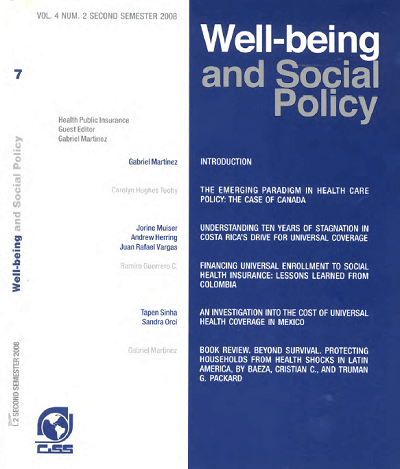
|
|
|
|

|
|
The emerging paradigm in heatlh care policy: the case of Canada
The model of health care financing and delivery for which Canada is best known internationally is its universal, single-payer, first-dollar system of coverage for physician and hospital services. For several decades following its establishment in the late 1950's and 1960's, this model provided public finance from the general tax base (like the UK), at levels of generosity, relative to GDP, like...
|
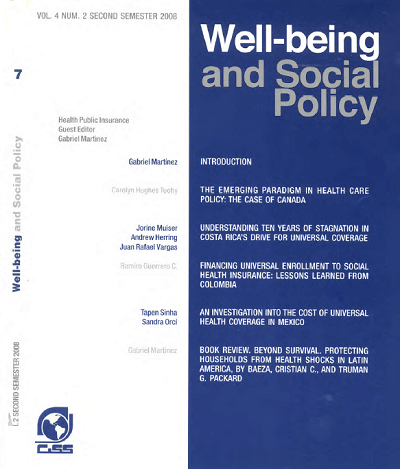
|
|
|
|

|
|
Understanding ten years of stagnation in Costa Rica's drive for universal coverage
This study analyzes achievements and obstacles in the process of moving towards universal coverage of essential health care services in Costa Rica. It describes the country as exemplary in the region, both in terms of population health status as well as health financing indicators. Life expectancy and the level of pre-payment are both comparable to high income countries. However, the process that...
|
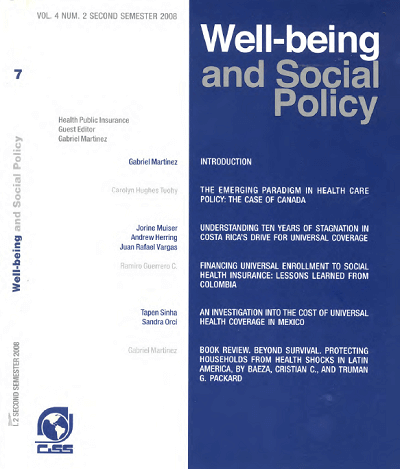
|
|
|
|

|
|
Financing universal enrollment to social health insurance: lessons learned from Colombia
The paper discusses the financing of the health care reform implemented in Colombia since the early nineties and explains the obstacles faced on the way to universal enrollment to social health insurance. The paper describes the reform and the sources created for its financing. It presents the observed trends in the financing of the insurance schemes created by the reform, identifies the...
|
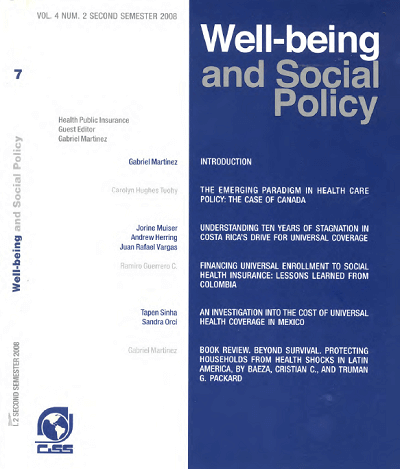
|
|
|
|

|
|
Book review. Beyond survival. Protecting households from health shocks in Latina America, by Baeza, Cristian C., y Truman G. Packard
The book by Cristian Baeza and Truman Packard is based on the next hypothesis: adverse health events reduce the consumption of goods and services different from health services, and many households become poor because of that. While the authors recognize that the evidence they present on the topic is limited, they propose the use of a “universal risk pool” as a way to eliminate the problem of...
|
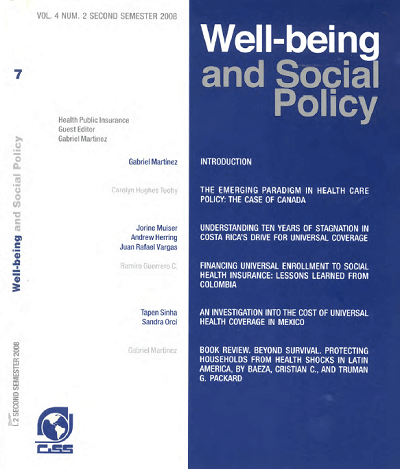
|
|
|
|
|